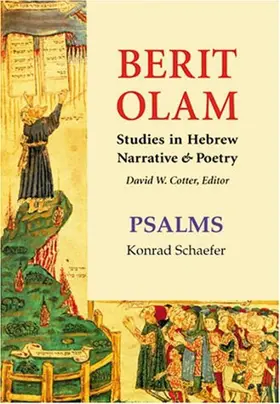

Psalms
in Berit Olam: Studies in Hebrew Narrative and Poetry
Pages
448
Publisher
Liturgical Press
Published
2001
ISBN-13
9780814650615
The psalms are masterful poems that echo the tenors of community life and worship as they project the scope of the human drama from lament to praise. They chart a profound and vital relationship with God, with all the ups and downs that this relationship implies. Konrad Schaefer's concise commentary on the psalms relates their poetic elements while respecting their historical context and traditional use in the liturgy and, more importantly, their ultimate value as a springboard to private and communal prayer.
In Psalms, Schaefer focuses on the structure of each psalm, its dramatic plot, the modes of discourse, the rhetorical features, and the effective use of imagery to portray theology and the spiritual life. Schaefer portrays each poem's inner dynamic to acquaint readers with the poet and the community which prayed and preserved the composition, allowing the believer to transpose it in the contemporary situation.
Psalms is for those who would like to pray the psalms with more intensity of meaning; for those willing to touch the biblical world and taste of its fruit in the Word of God; and for devoted readers of the Bible to become more expert as it helps experts become more devoted.
Chapters are "Introduction," "Book One (Psalms 1-41)," "Book Two (Psalms 42-72)," "Book Three (Psalms 73-89)," "Book Four (Psalms 90-106)," and "Book Five (Psalms 107-150)."
In Psalms, Schaefer focuses on the structure of each psalm, its dramatic plot, the modes of discourse, the rhetorical features, and the effective use of imagery to portray theology and the spiritual life. Schaefer portrays each poem's inner dynamic to acquaint readers with the poet and the community which prayed and preserved the composition, allowing the believer to transpose it in the contemporary situation.
Psalms is for those who would like to pray the psalms with more intensity of meaning; for those willing to touch the biblical world and taste of its fruit in the Word of God; and for devoted readers of the Bible to become more expert as it helps experts become more devoted.
Chapters are "Introduction," "Book One (Psalms 1-41)," "Book Two (Psalms 42-72)," "Book Three (Psalms 73-89)," "Book Four (Psalms 90-106)," and "Book Five (Psalms 107-150)."
Collections
This book appears in the following featured collections.
- Commentaries by Roman Catholic Scholars by John Dyer
Reviews
Collegeville, Minn.: Liturgical Press, 2001. Pp. xlv + 399. Cloth. $49.95.ISBN 0814650619. Richard G. Smith Taylor University Upland, IN 46989 In keeping with the design of the Berit Olam series, this commentary on the Psalms takes a synchronic approach to the received Hebrew text and its literary-rhetorical features. The work is intended to appeal to a wide audience, from lay people to professional biblical scholars. The author shepherds the Benedictine monastic community of Our Lady of the Angels in Cuernavaca, Mexico, where he also teaches in the Bible school and the diocesan seminary. The volume has a preface and an introduction followed by the psalm commentary proper, which is laid out according to the five books of the Psalter. Three appendices discuss the superscriptions, prehistory of the Psalter, and literary types. A list of works for further reading contains about forty references. Three indexes are devoted to scriptural references, general subjects, and Hebrew words. Schaefer recognizes in his preface (ii�x) that many Bible r eaders are particularly drawn to the Psalter. They repeatedly experience its content in novel ways with new insights. Even so, Schaefer is concerned that the images, phrases, and ideas encountered in the Psalter are sometimes far from the contemporary reader�s life and inte rest. Therefore, his commentary �seeks to respond to this difficu lty by adopting a particular focus in the appreciation of the psalms as poems which chart a profound and vital relationship with God, with all the ups and downs that such a relationship implies� (vii).
[Full Review]
Collegeville, MN: The Liturgical Press, 2001. Pp. xlv + 399, Cloth, $49.95, ISBN 0814650619. Carleen R Mandolfo Colby College Waterville, ME 04901 In line with the stated goal of the Berit Olam commentary series, Konrad Schaefer has provided an often fresh literary reading of the Psalter. Accordingly, Schaefer pays particular attention to the poetic structure and metaphorical characteristics of the psalms, with special interest in how these may be “transposed and interpreted in the contemporary life of the reader who wishes to contact God and understand life in relation to God” (p. viii). The book is arranged with an introduction that covers many of the basic structural—imagery; repetition and parallelism; context and sequence—as well as thematic—disease; enemies; curses—issues the reader will encounter in the Psalter. Highlighting their subordinate status, critical issues such as superscriptions, redaction, and Sitz im Leben are left to appendices. An index of Hebrew words is provided. The commentary proper is organized according to the liturgical division of the Psalter into five books. There are no full translations of the texts. The notes themselves display little interest in current critical issues dogging Psalms study (there is little to no discussion of wisdom redaction or form-critical categories, for example), focusing instead on stylistic and rhetorical features, while leaving aside as well the latest literary critical trends (not surprisingly then, there are very few footnotes). Schaefer is, however, cognizant of the likely ancient (and actual modern) liturgical setting of any given psalm. An entire section in his introduction that concentrates on shifts of address and modes of discourse substantiates this assumption, as do references in his notes. Anyone familiar with the sensitivity with which Luis Alonso Schökel has read biblical poetry will immediately notice his influence on Schaefer’s perspective and style.
[Full Review]
